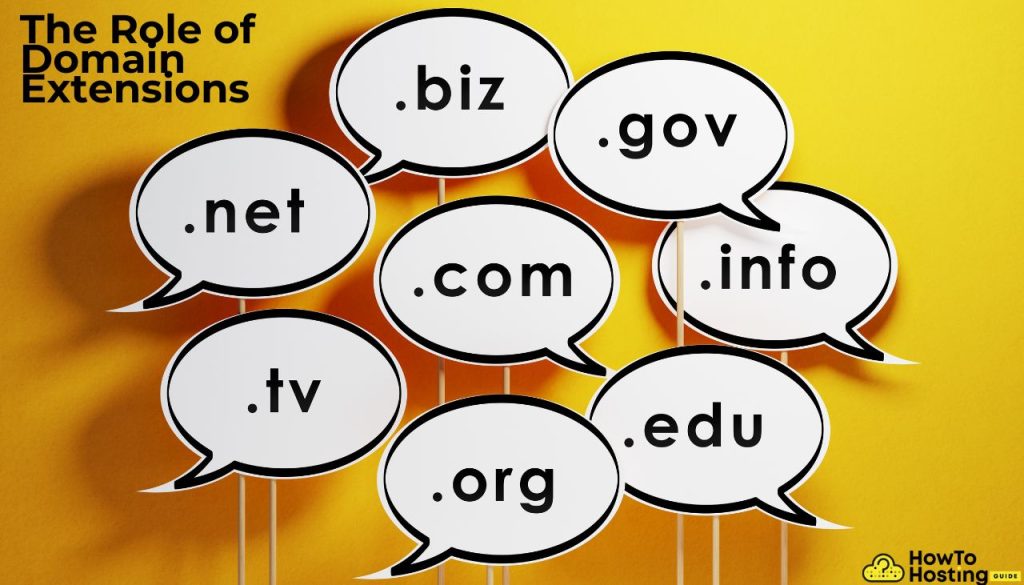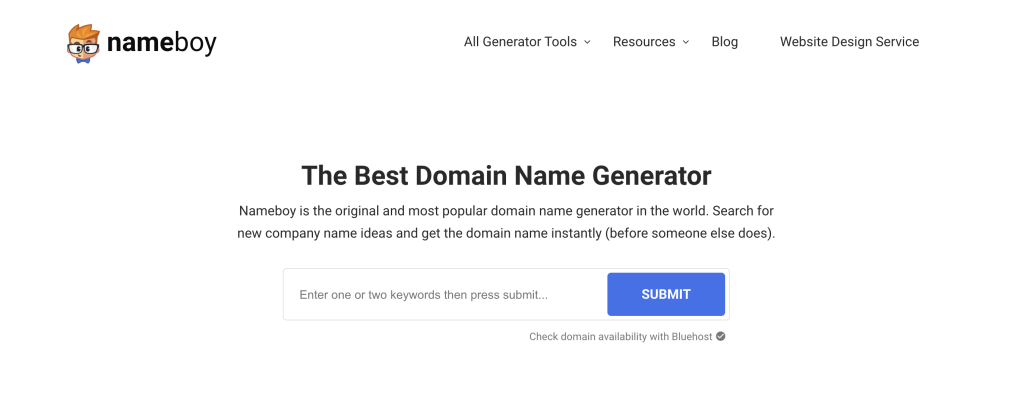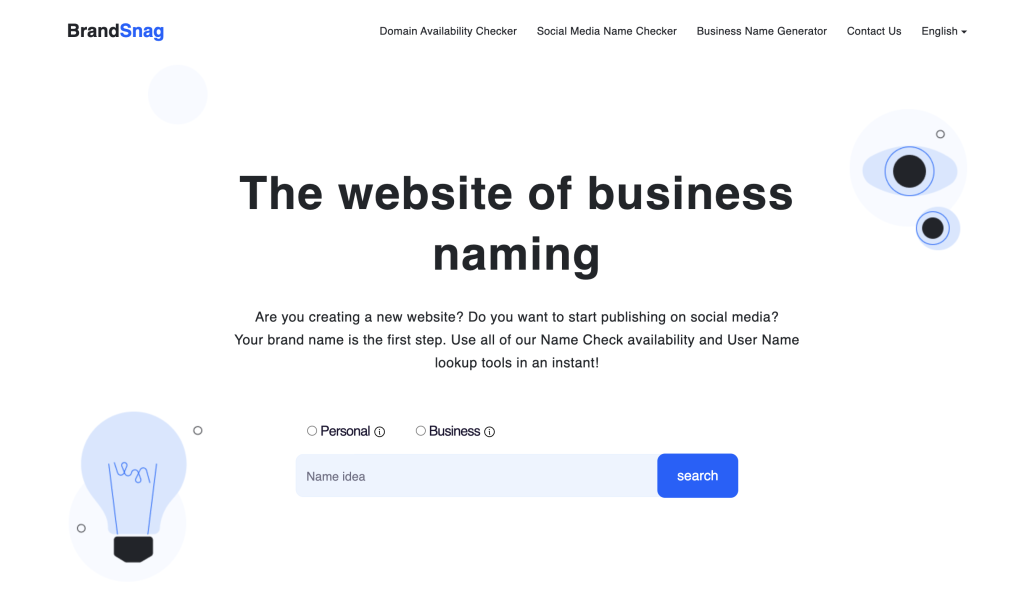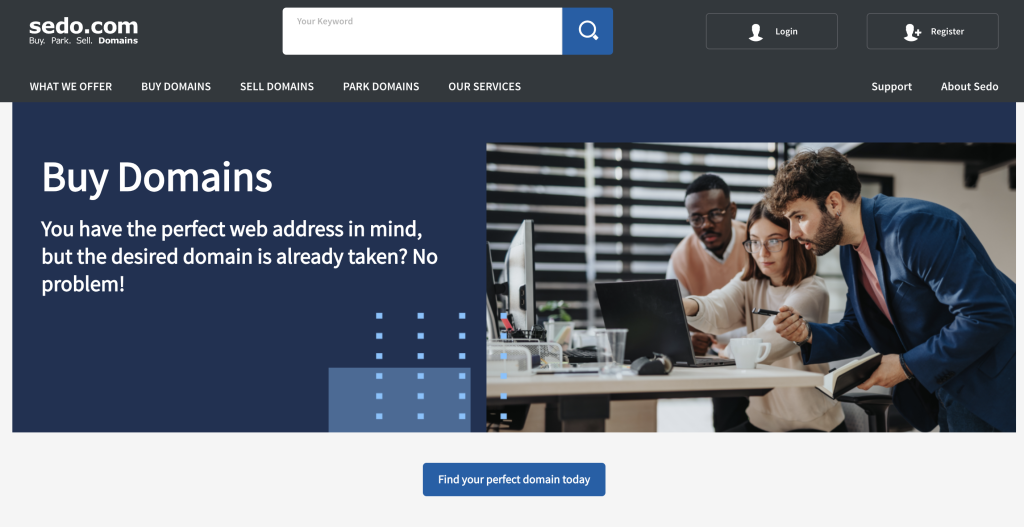On This Page: [hide]
Choosing the right domain name for your ecommerce business is a critical decision that can profoundly impact your brand’s identity and success online.
Not just a mere label, your domain acts as the first point of interaction between your company and potential customers, establishing a foundation of trust and visibility in a crowded online marketplace.

Why Is Selecting the Right Ecommerce Domain Critical?
Selecting the right domain for your ecommerce business goes beyond just a name – it’s a cornerstone of your brand identity and online presence. A well-chosen domain can significantly influence your site’s visibility and affect user trust, which are crucial for securing sales and building a loyal customer base.
Strengthen Your Brand Identity
Your domain name is a powerful tool for building and reinforcing your brand identity. It’s an opportunity to use your brand name as a beacon that attracts potential customers. A domain that aligns closely with your business name not only reinforces your brand but also makes it easier for customers to remember and return to your site.
Opting for a domain name that reflects your brand ethos and product range can set you apart in a crowded marketplace and help establish a strong, memorable brand identity.
Improve Online Visibility and SEO
A strategic domain name can significantly improve your website’s visibility on search engines. Including relevant keywords within your domain can boost your SEO efforts, making it easier for potential customers to find you through organic search.
Moreover, a memorable and easy-to-spell domain increases the likelihood of direct traffic, as users are more likely to recall your website’s address. When considering SEO, remember that a .com domain, though not the only option, is often favored by search engines and users alike, potentially aiding in higher search rankings and increased visibility.
Define Your Brand in Keywords
Start by brainstorming keywords that encapsulate your brand’s essence. Think about the products or services you offer, your target audience, and your brand values. These keywords will serve as a foundation for your domain name, helping it resonate with your customer base and enhance your online presence. Keep the list focused and relevant to maintain clarity and effectiveness in your domain name.
Analyze Competitor Domain Strategies
Looking into the domain names of your competitors is more than just a research exercise – it’s a strategy to gauge market trends and consumer preferences. Identify common patterns, prefixes, and suffixes used within your industry. This insight will guide you in choosing a domain name that’s both competitive and on par with industry standards. However, strive for uniqueness to ensure your domain stands out.
Consider Using Geo-Location or Industry Keywords
Including geo-location or industry-specific keywords can significantly impact your SEO and help local customers find you more easily. If your business is rooted in a particular location or if you’re targeting a specific market, integrating related keywords into your domain name can be beneficial. This tactic also reinforces your brand identity and niche specialism to potential customers.
Opt for Short, Memorable Names
A short and memorable domain name aids in brand recall and simplifies the process for potential customers to find your website. A succinct name lessens the risk of typographical errors and facilitates word-of-mouth marketing. Aim for creativity and simplicity, ensuring the domain name is easy to spell and pronounce, providing a seamless experience for your audience.
Why .com Might Still Be King
While various domain extensions are available today (.net, .shop, .biz), .com remains the most recognized and trusted. A .com domain suggests credibility and longevity in the eyes of consumers and can influence user perception positively. Additionally, since it’s the default extension many people gravitate to, having a .com can help avoid confusion and ensure that customers reach your site effortlessly.
The Role of Domain Extensions in Ecommerce Success
Choosing the right domain extension is a pivotal decision for any ecommerce entrepreneur. Domain extensions, often seen as a minor detail, actually play a significant role in creating your online storefront’s identity. They not only influence how your brand is perceived but also affect search engine optimization (SEO) and, ultimately, your store’s visibility to potential customers.

A common extension like .com is universally recognized and can imbue your site with an aura of established credibility. Meanwhile, niche-specific extensions such as .shop or .store immediately inform visitors about the nature of your business, possibly increasing relevant traffic and enhancing user experience. The correct domain extension aligns with your brand, market position, and long-term goals, serving as a silent ambassador for your online business.
When to Select Niche-specific Extensions
Opting for a niche-specific extension can be a strategic move under certain circumstances. Firstly, if your business model is strictly ecommerce, extensions like .store or .shop can provide clear context to what your website is about, making it more attractive to users specifically looking for shopping sites.
Secondly, if your brand strongly identifies with a particular industry or hobby, niche extensions like .tech or .fashion can underscore your niche expertise, helping to attract a targeted audience. Finally, selecting a niche-specific extension can be beneficial when the desired .com domain is not available. It allows you to create a unique, memorable brand identity without compromising your website’s purpose and message.
The Impact of Novel Extensions on Brand Perception
The introduction of new domain extensions has diversified the options available for businesses, but it’s crucial to assess how these choices may impact brand perception. Novel or unusual extensions might stand out, offering a creative edge, but they could also confuse potential customers or make your site appear less credible. It’s essential to consider your target audience and whether an innovative domain extension aligns with their expectations and your branding strategy.
For a technology start-up, an extension like .io might resonate with tech-savvy customers and convey a sense of industry insight. However, more traditional businesses or industries might benefit from sticking with more recognized extensions to maintain trust and authority. The key is blending innovation with customer expectations to support your brand’s image and goals.
The .beauty extension, for example, is perfect for cosmetics and beauty retailers, adding a touch of elegance to your brand. If you’re offering Black Friday deals, the .blackfriday extension sets the stage for seasonal success. Trendy boutiques can enhance their style with .boutique, while .buy delivers a direct call to action, encouraging customers to make purchases.
For businesses focused on promotions, .deals serves as a clear signal of savings. The .ecom extension ties your website directly to the ecommerce industry, making it easier for customers to remember. Fashion enthusiasts will love .fashion, while .gifts adds a festive touch, ideal for holiday shoppers.
High-end retailers can elevate their brand with .luxury, and .sale speaks directly to discount-seekers. Lastly, the .tienda extension is perfect for retailers targeting Spanish-speaking customers, offering a culturally relevant and accessible option for expanding your market.
Utilize Domain Generators to Spark Creativity
With over 360 million domain names already registered, finding the perfect domain name for your business or blog can seem like a daunting task. This is where the magic of domain name generators comes to the rescue. These innovative tools are designed to take the guesswork out of choosing a domain name, making the process both efficient and engaging.
Domain name generators work by taking keywords that describe your brand or business and generating hundreds of creative domain name ideas. This not only saves time but also introduces a level of creativity and inspiration that might not be achieved through traditional brainstorming methods.

Consider the attributes that best represent your brand. For luxury brands, words like “elegant,” “quality,” “custom,” and “modern” may resonate. For tech companies, terms like “innovative,” “cutting-edge,” “smart,” and “next-gen” could be more appropriate. Compiling a comprehensive list of such words and involving your team can widen the pool of ideas. Also, using a thesaurus to find synonyms can add further depth to your options.
Once you have your list prepared, inputting these words into a domain name generator can unveil a treasure trove of domain names. Whether you’re drawn to compound names, multi-word names, or invented names, these generators can provide exciting insights and ideas. Although the process may seem exhaustive, its value cannot be understated. An attractive, memorable domain name serves as the cornerstone of your digital identity, making this creative endeavor well worth the effort.
Furthermore, domain generators offer functionality that allows you to see not only available domains but also those on sale, providing a broader spectrum of possibilities. Instant Domain Search is another notable example, enabling real-time suggestions as you type. This immediacy can make the search for the perfect domain name not only productive but also unexpectedly fun.
How to Verify the Availability and Legality of Your Chosen Domain
Before embarking on the journey of launching your brand’s online presence, securing a domain name that is both available and legally sound is a fundamental step. This proactive approach ensures your brand’s identity is safeguarded across the digital sphere, contributing to a cohesive and recognizable brand image.
Avoid Trademark Infringements
Trademark infringements can inadvertently entangle your brand in legal disputes, making it essential to conduct thorough research before finalizing your domain name. Here are steps to ensure your chosen domain is free from potential legal encumbrances:
- Utilize the United States Patent and Trademark Office’s online database to search for existing trademarks that could conflict with your desired domain name.
- Engage in a comprehensive Google search to uncover any businesses that might be using a similar name in your industry.
- Consult with a legal expert to analyze the potential risks associated with your domain name choice, ensuring it’s distinctive and does not infringe on existing trademarks.
Adhering to these steps reduces the risk of costly legal challenges and reinforces the uniqueness of your online identity.
Check Social Media Handle Availability
In today’s interconnected digital environment, aligning your social media handles with your domain name is crucial for brand consistency. To verify the availability of your chosen handle across multiple platforms, follow these streamlined steps:
- Access a social media username checker, such as BrandSnag, which simplifies the process by offering a consolidated view of handle availability across various platforms without requiring registration.
- Input your domain name in the search field to check for available handles. If your preferred handle is taken, consider slight modifications, like adding prefixes or suffixes, to find a close match that maintains your brand identity.
- Upon finding the perfect social media handle, promptly claim it across all relevant platforms. This ensures it’s reserved for your brand as you expand your digital footprint.

Securing matching handles not only streamlines your brand’s online visibility but also makes it easier for your audience to connect with you across different digital touchpoints.
How to Negotiate for Already Owned Domains
Finding the perfect domain name only to discover it’s already taken can feel like a setback. However, it may not be the end of the road. Through negotiation, you might still secure your ideal domain. This process involves approaching the current owner with an offer, exploring domain auctions, and leveraging marketplaces. The key here is to approach with a realistic mindset, understanding the value of the domain not just to you, but in the broader market.
Approach the Current Owner
When a desired domain is already taken, initiating a direct conversation with the current owner can be a strategic move. The first step is to find the owner’s contact details, which are usually available through the WHOIS database. This information provides the groundwork for establishing contact.
When reaching out, it’s important to convey your interest in purchasing politely and professionally. Highlight your intent and suggest the willingness to negotiate. Remember, expressing too much eagerness might weaken your negotiating position. Instead, show interest without revealing the utmost urgency or your ceiling price.
To enhance the likelihood of a successful outcome, consider the following steps:
- Maintain a professional tone in your communication.
- Be clear about your intentions but open about the terms of negotiation.
- Prepared to counteroffer, setting a realistic budget for the domain purchase.
- Express flexibility in negotiation, indicating a range rather than fixed numbers.
While direct negotiation can lead to a successful purchase, be prepared for it to take time. Domain owners may have sentimental value attached to their domains or may hold out for higher offers, especially if they’re aware of its potential value to your business.
Consider Domain Auctions and Marketplaces
Domain auctions and marketplaces offer a viable alternative to direct negotiation, often presenting opportunities to acquire domains that are no longer in active use but still hold considerable SEO value due to their history and age.
Platforms such as GoDaddy Auctions or Sedo specialize in listing pre-owned domains, providing a wide selection for prospective buyers.

Here’s how to make the most of these platforms:
- Conduct thorough research: Before placing a bid or making a purchase, research the domain’s history to ensure it’s free from penalties and aligns with your brand’s image and SEO goals.
- Monitor auctions regularly: Staying active on these platforms helps you spot good deals and understand the market better, including pricing trends for certain types of domains.
- Set a budget: It’s easy to get caught up in bidding wars. Determine your maximum spend beforehand to avoid overspending on a domain.
- Use proxy bidding: Many auction sites allow you to set a maximum bid, and the system will automatically bid on your behalf up to your limit, which can help in managing multiple auctions simultaneously.
Purchasing a domain through auctions or marketplaces does not only mean obtaining a name for your website; it’s about acquiring a piece of online real estate that can significantly impact your brand’s online presence. Therefore, it’s crucial to approach this process with strategic planning, from initial research to the bidding or negotiation stage.
Remember, whether negotiating directly with the current owner or bidding in an auction, acquiring a desired domain is often a blend of strategy, patience, and sometimes, a bit of luck. With the right approach, however, you can significantly enhance your chances of securing a valuable asset for your online brand.
How to Choose a Registrar: Key Factors to Consider
Deciding on the right registrar for your domain can significantly impact the ease of managing your website in the future. Prices, services, and security features differ widely among registrars, so taking the time to compare options is crucial.
Look for reputable registrars that offer competitive pricing, but also prioritize those with a track record of reliable customer service. In addition, consider the variety of domain extensions they offer and how those extensions align with your business.
A good registrar should also provide an easy-to-navigate website and straightforward domain management tools. These factors combined will not only ensure the security and proper management of your domain but also enhance your website’s credibility.
Think of of Domain Privacy and Security
Protecting your personal and business information online cannot be overstressed, making domain privacy and security key features to look for when registering your domain. WHOIS privacy protection is essential as it prevents your personal information from being publicly available in the WHOIS directory.
This service typically substitutes your information with that of the registrar’s privacy service, thus shielding your identity. Furthermore, ensure your domain comes equipped with SSL (Secure Sockets Layer) encryption. SSL protects the data exchanged between your website and visitors, instilling trust and supporting your site’s security.
Choosing a registrar that provides these features as standard, such as Shopify, offers a solid foundation for securing your website from the outset. Such measures not only protect your personal and business information but also contribute significantly to the credibility and trustworthiness of your website in the eyes of your visitors.
FAQs on Choosing an Ecommerce Domain
How often should I renew my domain?
Renewing your domain is critical in maintaining your online presence and protecting your brand. Domains are commonly renewed on an annual basis. However, many registrars offer the flexibility to purchase multi-year plans, allowing you to secure your domain for up to 10 years at a time.
This not only offers peace of mind but can also lock in your renewal rate, protecting against potential price increases. It’s essential to set reminders for your renewal dates or opt for auto-renewal features offered by registrars to ensure continuous service and avoid losing your domain inadvertently.
Can I transfer my domain to another registrar?
Yes, it is possible to transfer your domain to another registrar. This process typically involves a few steps, including unlocking the domain at your current registrar, obtaining an authorization code (also known as an EPP code or transfer key), and initiating the transfer at the new registrar using this code.
It’s important to ensure your domain is not within 60 days of registration or a previous transfer, as ICANN policies typically restrict transfers within this window. Also, ensure your contact information is up to date, as you will receive confirmation emails to approve the transfer. Transfers usually take a few days to complete, depending on the registrars involved.
What if my ideal domain is taken but not in use?
If your preferred domain is already taken but not actively used, you might still have a chance to claim it. First, try to contact the current owner directly to inquire if they’re willing to sell. Contact information can often be found via WHOIS lookup tools, though privacy settings might restrict this information. If direct contact isn’t possible, consider using a domain broker service to negotiate on your behalf.
Be prepared for negotiations and potentially high prices, depending on the perceived value of the domain. Alternatively, brainstorming alternate names or considering different top-level domains (TLDs) might yield a creative and even more suitable option for your brand.
